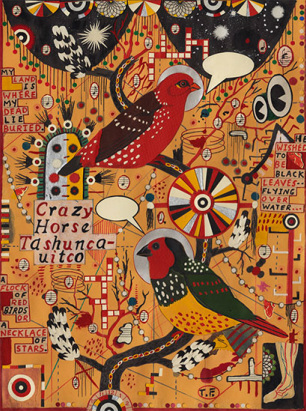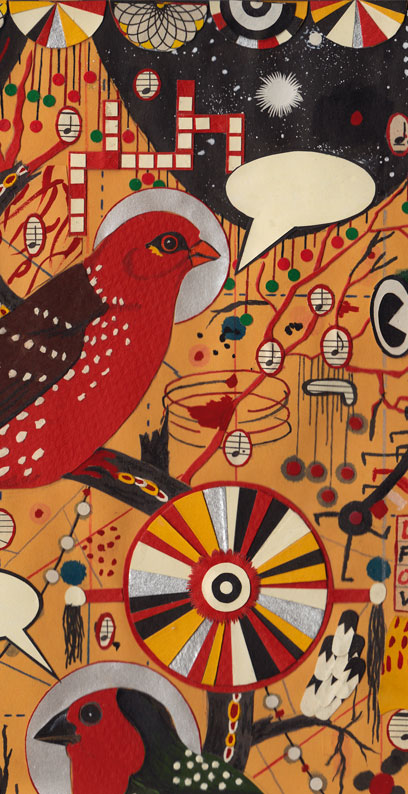Tony Fitzpatrick
(more Fitzpatrick images ->)
|
BIRDS FOR CRAZY HORSE
water color, ink, and paper ephemera on paper, 9" x 12” Crazy Horse wanted little to do with other people, red or white. He was happiest out wandering in nature. He was as content to sleep in a cave or a hole, as he was in a camp. He loved being out under the stars and was comfortable with his own company. There was a reason the Oglala Lakota referred to him as “our Strange Man.” His nonconformity set him apart in a tribal culture. He had much responsibility in his tribe. He was among the most fierce of warriors; a brilliant tactical fighter and a superb hunter, and to his tribe, he was necessary and he was up to shouldering his immense responsibility to his people. He hunted buffalo, he led war-parties and raids, but when the opportunity arose, he would go off by himself to be in nature and fast and seek visions. He was curious about the spirits and the next world and he sought wisdom. Like Basho, he was always searching and seeking knowledge. In Tokyo, I visited some Shinto shrines and was struck by how much Shintoism reflects the beliefs of some Native American beliefs as well. I’m not religious at all, but do tend to cede the power most attribute to god, to nature. The Shinto teachings have an intense reverence for the natural world and the shrines are sublimely beautiful. In battle Crazy Horse adorned his forehead with three hailstones and red lightning bolts on each cheek. He also carried a small pebble or hailstone behind his ear. These images were powerful talismans in his life and visions. When it would hail, the Native American believed it was raining stone and, depending which text you read, this was alternately ominous and hopeful at the same time. It may sound odd that I once went to Japan to better understand Crazy Horse, but I think it helped. In every culture, there are these odd-spirited men who don’t quite fit into the world easily, yet they push that culture forward for better and ill. They are necessary people who don’t want to punch a clock or color inside the lines. There is an otherness about them. In Japan, the Haiku monks were thought to be oddballs in their day. Basho was an admirer of Li-Po, the great Chinese poet of the 8th century, another wandering spirit enamored of wandering in nature. It is not an accident that Haiku is rooted in nature and reflects the seasonal shifts of one’s lifetime. I hope that after Crazy Horse was murdered, he went somewhere. He certainly deserved better than he got. I don’t believe in the afterlife, but I’d like it if he had one. Haitians refer to the land between the living and the dead as the “Gray World” and there is no time continuum; it is a place where Basho and Crazy Horse could meet. I hope wherever Crazy Horse went, he wore a necklace of stars. - Tony Fitzpatrick |


